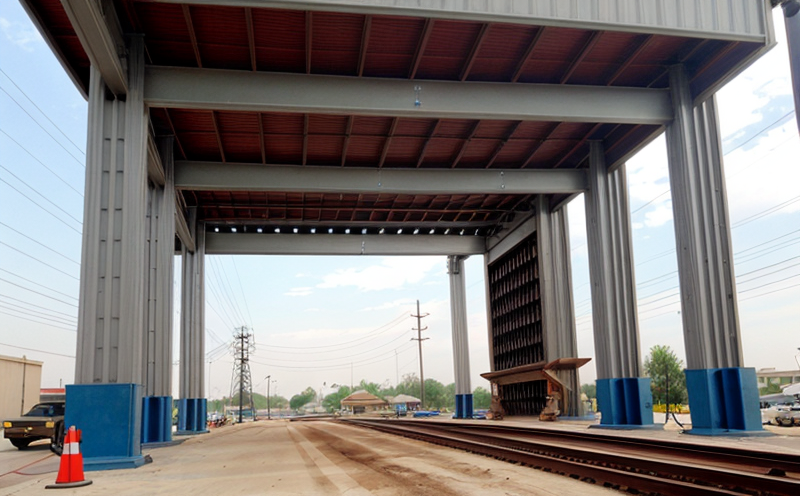EN 6088 Fracture Mechanics Testing of Aerospace Structures
The European Standard EN 6088 specifies procedures and criteria for fracture mechanics testing, particularly relevant in the aerospace industry where structural integrity is paramount. This service focuses on evaluating the fatigue crack growth and the critical stress intensity factors (KIC) of materials used in aircraft structures. It ensures that components can withstand the harsh environmental conditions and cyclic loading they encounter during operation.
Fracture mechanics testing under EN 6088 involves subjecting specimens to controlled cyclic loads until cracks initiate or grow beyond a specified threshold. The test aims at identifying potential flaws early, preventing catastrophic failures in critical aerospace components such as airframe structures, engine casings, and landing gear. This process is crucial for ensuring the safety and reliability of aircraft systems.
Our laboratory adheres strictly to EN 6088 standards throughout all stages of testing, from specimen preparation to final analysis. Specimens are carefully prepared according to ISO 179-2 methods, ensuring uniformity and consistency in test results. The testing apparatus includes advanced fatigue testing machines capable of applying precise cyclic loads over extended periods.
For accurate measurements, we use specialized non-destructive evaluation (NDE) techniques like ultrasonic testing (UT), radiography, and magnetic particle inspection (MPI). These methods help in detecting initial cracks and assessing the propagation rates under specified loading conditions. The test data is meticulously recorded using automated systems that ensure repeatability and accuracy.
The acceptance criteria for EN 6088 tests are stringent and are based on international standards such as ISO 179-2 and ASTM E845. Compliance with these standards ensures that the results are reliable and can be used to make informed decisions about component design and material selection. Our team of experts provides detailed reports highlighting key findings, including crack initiation points, growth rates, and final fracture locations.
Understanding the mechanics behind fractures is essential for predicting the lifespan of aerospace components. By conducting these tests, we not only meet regulatory requirements but also contribute to the advancement of safety standards in aviation technology. This proactive approach helps manufacturers improve product quality and reduce the risk of unforeseen failures during service.
Benefits
- Enhanced Safety: Ensures that aerospace components can withstand the stresses they encounter without compromising on structural integrity.
- Predictive Maintenance: Identifies potential weaknesses early, allowing for timely interventions to prevent failures during operation.
- Regulatory Compliance: Adherence to international standards ensures compliance with aviation regulations and safety certifications.
- Improved Product Quality: By detecting flaws early in the development process, this testing improves overall product reliability and durability.
The benefits extend beyond just the aerospace sector. The insights gained from these tests contribute to advancements in materials science and structural engineering, benefiting not only aviation but also other industries that rely on robust, long-lasting components.
Eurolab Advantages
At Eurolab, we pride ourselves on offering comprehensive fracture mechanics testing services tailored specifically to the aerospace industry. Our expertise in this field is backed by years of experience and a commitment to delivering high-quality results consistently.
- Experienced Staff: Our team consists of highly qualified professionals with extensive knowledge of EN 6088 standards and best practices.
- State-of-the-Art Equipment: Equipped with cutting-edge fatigue testing machines and NDE tools, we ensure precise and reliable test results.
- Comprehensive Reporting: Detailed reports provide comprehensive insights into the performance of tested components, supporting informed decision-making.
- Dedicated Support: Our dedicated account managers are available to assist with any queries or requirements throughout the testing process.
With Eurolab, you can trust that your aerospace components will undergo rigorous and accurate testing, ensuring they meet the highest safety standards required by international regulations.
Customer Impact and Satisfaction
- Increased Confidence: Customers gain confidence knowing that their products have been thoroughly tested to ensure reliability and safety.
- Reduced Risk: By identifying potential issues early, customers can mitigate risks associated with component failures during service.
- Cost Savings: Early detection of flaws helps avoid costly repairs or replacements down the line.
- Better Reputation: Compliance with international standards enhances a company's reputation in the aviation and aerospace sectors.
Customer satisfaction is at the heart of our service. Our commitment to quality, reliability, and safety ensures that customers receive the best possible results from their fracture mechanics testing. Feedback from satisfied clients reinforces our dedication to excellence in this critical area of aerospace testing.





